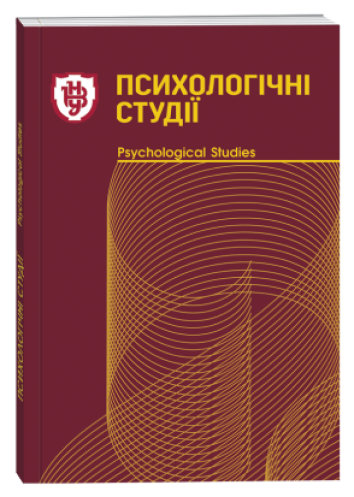PSYCHOLOGICAL WELL-BEING OF PROFESSIONAL AND HIGHER EDUCATION GRADUATES WHO ENGAGE IN SPORTS
DOI:
https://doi.org/10.32782/psych.studies/2024.1.14Keywords:
psychological well-being, students of vocational pre-university education, students of higher education, sports, positive relationships, autonomy, environmental management, goals in life, personal growth, self-acceptanceAbstract
The article is devoted to the actual problem of today – psychological well-being, which is considered as a complex phenomenon associated with the positive functioning of the individual, the achievement of happiness and life satisfaction, self-realization. It is noted that in the case of realizing their potential in sports, students improve their psychological well-being, they have new life goals, they are capable of mastering new types of activities, independence of behavior, personal growth, building positive relationships, accepting both their strengths and weaknesses. The results of an empirical study of the psychological well-being of students of vocational pre-higher and higher education who study in the specialty 014.11 Secondary Education (Physical Culture) and are engaged in various sports are presented. It was established that the average value of the integral indicator of psychological well-being among student-athletes is 366.3, which corresponds to the average level and indicates sufficient psychological well-being of the respondents. It was found that the average indicator of psychological well-being is somewhat higher among students who are engaged in sports and who are getting an education on the educational and professional degree of a professional junior bachelor, compared to those who have obtained the first (bachelor) level of higher education. In both groups of subjects, this indicator corresponds to the average level of psychological well-being, which indicates moderately positive personality functioning. It was established that male and female representatives have the same (average) level of psychological well-being, with slightly higher values in female athletes. It has been found that those who have acquired professional pre-higher and higher education, who play sports at a sufficient level, are able to build caring and trusting relationships with others; able to resist social pressure; moderately strive for independence in actions; are capable of meaningfulness of their existence; they have an average level of past, present and future value; inherent moderate desire to realize one's personal potential; they are capable of adequate self-assessment and acceptance of themselves, their strengths and weaknesses.
References
Ryan R. M., Deci E. L. On happiness and human potentials: A review of research on hedonic and eudaimonic well-being. Annual Review Psychology. 2001. №52. P. 141–166. UR : http://surl.li/qylqn (дата звернення: 20.02.2024).
Карсканова С. В. Опитувальник «Шкали психологічного благополуччя» К. Ріфф: процес та результати адаптації. Практична психологія та соціальна робота. 2011. №1. С. 1–10.
Шамич О.М., Сердюк Л.З., Іваннікова Г.В. Фізична культура і спорт як основа здоров’я і благополуччя особистості: навч. посіб. Київ : КНУБА, Талком, 2023. 130 с.
Московець Л. П. Психологічне благополуччя педагогічних працівників літнього віку. Перспективи та інновації науки. Серія «Психологія». 2022. №6 (11). С. 461-472. URL: http://surl.li/qylps (дата звернення: 21.02.2024).







